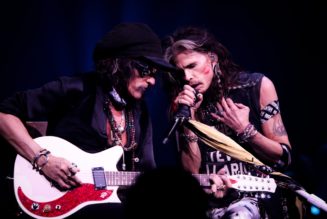2020 will certainly go down in the annals of music history as not only one of the most difficult, but also among the most seminal. The music community—and the entertainment industry at large—have had to completely rethink their strategies in order to stay afloat. AEG, Live Nation, and a number of other music industry giants have struggled to remain in business.
But deep within the roots of music, innovators like Stephanie LaFera, WME’s Head of Music, have used these unprecedented times to reshape the music industry.
LaFera oversees a team of agents whose roster includes major dance music acts such as Calvin Harris, Kygo, Steve Aoki, TOKiMONSTA, Martin Garrix, Marshmello, Eric Prydz, Grimes, and many more. In the midst of the devastating COVID-19 pandemic, LaFera has succeeding in creating opportunities for her artists, like stewarding Kygo’s successful Golden Hour Festival and securing brand partnership deals with Fortnite and Sour Patch Kids for Aoki.
LaFera also continues to push for equality across the industry. She works closely with the Association for Electronic Music (AFEM) to help galvanize the global dance music community and dismantle institutionalized racism. She served as co-chair of the dance music committee for She Is the Music, as well as played an important role in assembling the Dance Music Diversity Initiative.
EDM.com chatted with LaFera about her leadership within the current state of the music and how she has set her team up for productivity and efficiency during times of a strife.
EDM.com: Thanks for your time today and congrats on all of your success. It’s inspirational to see everything that you’ve achieved. Tell us a little more about your role as the Head of Electronic Music at WME. What’s a day in the life like?
LaFera: Thank you, that is very kind of you to say. I was lucky to walk into an incredible team of agents and artists that were already here. WME Electronic has been so instrumental in the growth of this music and has a proven track record of creating lasting global businesses for our artists. I’m excited to bring a fresh perspective to the team and forge a path for our continued growth.
Currently my days are filled with consistent communication with the team about what new opportunities we can bring to our clients, not to mention booking meetings, A&R meetings, keeping up with managers, promoters and artists. This company is armed with so many unique ways to bring an artist’s vision to life, that it’s like being a kid in a candy store for me. So I’ve spent a good amount of time getting to know the different departments here and learning about all they have to offer.
EDM.com: 2020 has given every team and music professional a run for their money in terms of innovation and strategy. How did you evolve your strategies within your team to fit the global pandemic?
LaFera: Within a few days we saw our entire international touring industry come to a standstill. With so much disruption happening everywhere, we put our focus and energy into finding ways to help our clients continue to bring performance to the audiences.
From pod shows, drive-ins, sponsored livestreams, ticketed livestreams, virtual meet & greets, private zoom performances, VR shows in games, there are so many ways that people are creatively trying to bring the music to fans. These are areas the agency was already very active in but now with everyone at home there was more demand than ever to create a new experience.
EDM.com: How can an artist and their team approach a brand deal or partnership? What should they look out for?
LaFera: The partnership being authentic is always the most important thing, but if you’re a DJ selling cologne—or whatever it might be—you need to clearly explain the “what” and “why” of that partnership. How does that brand speak directly to your passion? The Branding Department at WME is second to none and their expertise ensures that the artists under our banner don’t have to go through this process alone.
EDM.com: The global protests sparked by George Floyd’s death have illuminated systemic racism in our country. What changes are you seeing and implementing to change these behaviors in the electronic music industry?
LaFera: I took the time to really reflect on my own relationships and hiring practices to ask myself, “How can I become a better ally?” I’ve always been actively involved in equal gender representation in the music community, but now I spend a lot of time thinking about how we can have artists, executives, tour managers, publicists, et cetera, that truly reflect the audience we are doing shows in front of or that are streaming this music. While I hope that those who are in a position to lift people up do so with an openness to all cultures and communities, I know it won’t happen on its own. So I speak up.
If I see a lineup that looks off-balance or walk into a room full of people that all look the same, I call attention to it. I understand that many people aren’t in a position where they feel they can speak up about such things, but we have to continue to be on the offense when dealing with systemic racism and gender bias. There are some encouraging signs that changes are being implemented. I love seeing the way the DSPs have taken this moment to highlight artists that might not have been given a playlist cover in the past. There seems to be a real desire to course correct and to make the necessary changes instead of just talking about it.
EDM.com: What types of things can music professionals do to accelerate this process and further the cause?
LaFera: Offer to help. Open your schedule to mentor people. If you are in a position to hire someone make sure you really open that opportunity up to a broad group of candidates. The changes will take time but the willingness to make the change has to be a daily thing. Each and every day you have to make it a conscious priority to create an environment that everyone has access to, and where all feel welcome.
EDM.com: Your career as an artist manager is incredibly admirable. How has your experience as a manager helped the transition into WME?
LaFera: Creating opportunities for artists while also maintaining a business around them is not that far off from what I am doing here at WME. I spent almost 20 years waking up thinking about how to make someone else more successful and bring the art they make to the masses. I’m using the same skill set here to bring ideas to the teams while supporting the agents to deliver for the clients.
EDM.com: What is the most useful skill or tool set to have in the electronic music business?
LaFera: Love the music! If you don’t feel connected to this music, culture and the incredible community around it, then you’re missing the best part of working in this business. Having an entrepreneurial spirit also helps.
EDM.com: You mentioned in your Rolling Stone interview that you were taught to treat everyone with respect—interns, janitors, and CEOs alike. As a child, what was the best lesson you were ever taught?
LaFera: I’m the youngest of a family of seven and am lucky enough to call my sisters, brothers and parents my best friends. We all support each other, and it allowed us to go into the world to pay that support forward. My parents led by example, be kind, work hard, but don’t forget to spend time with friends and family.
EDM.com: What advice would you give to women working in the music business?
LaFera: There is room at the table for you!









![Listen to the Spine-Chilling Debut EP from LŪN, the Secret Electronic Alias of Lights [Exclusive]](https://www.wazupnaija.com/wp-content/uploads/2021/04/listen-to-the-spine-chilling-debut-ep-from-lun-the-secret-electronic-alias-of-lights-exclusive-327x219.jpg)